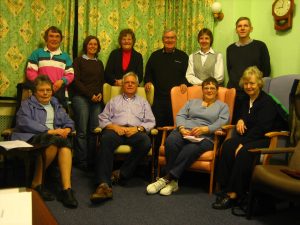 Who hasn’t known grief? I still remember grieving for a poorly kitten that died when I was about eight years old. I had a very matter-of-fact mother who thought it was just a passing upset and I would soon soon get over it, but even now, all these years and a life-time later, I remember it. It was my first bereavement. Not as shattering or life-changing as the precious ‘beloveds’ who died later in my life, but the kitten’s dying is still a deep sorrow.
Who hasn’t known grief? I still remember grieving for a poorly kitten that died when I was about eight years old. I had a very matter-of-fact mother who thought it was just a passing upset and I would soon soon get over it, but even now, all these years and a life-time later, I remember it. It was my first bereavement. Not as shattering or life-changing as the precious ‘beloveds’ who died later in my life, but the kitten’s dying is still a deep sorrow.
Do you remember the TV commercials that British actress Maureen Lipman used to make for British Telecom? Do you remember the one where she hears, in a phone call, that her son had passed his exams and now had an ‘ology’? (‘Jack’s got an ‘ology!’) It was brilliant.
Ms Lipman is a comedienne as well as an actress, and her timing was always perfect. Except, it turns out, when it came to grieving the death of her husband.
When he died in 2004, she and Jack Rosenthal had been married for 30 years. She found it almost impossible to grieve then, she said, because her nature is to make people laugh. She told Prima magazine last week, ‘I’d feel terrible about the fact I didn’t look like I was grieving enough. To try to make myself feel better, I bought things. I bought a car, then I worried that people would think it was odd; why would she buy a car when her husband has just died? But I now know that we all grieve in our own ways.”
Sometimes it’s other things that prevent us receiving the healing that grieving brings. It can be regret, or unforgiveness or guilt. People who care for family members with dementia can often experience complicated grief and need help getting emotions untangled.
Here in the UK we don’t seem to be all that good at grieving. The death of Princess Diana loosened the Brit. stiff upper lip for a while, but we really still don’t do it well ourselves or, most of the time, help others as we could.
When I first heard professional wailers in the Middle East I thought what a wonderful concept – that they could release, on your behalf, your howls of outrage and grief. You could remain outwardly composed but they showed that what you were really doing inside was screaming and keening and beating your chest and waving your fists in the air.
There’s so much grief in the world at the moment: waves of it have crashed all around us. So many people I know have a Covid tragedy.
So I’ve written a booklet on coping with grief and loss, in a Christian context. It’s based on cognitive behavioural principles, and describes things you can do to grab the controls and ride the storm. Each person’s grief is unique, but the aim is to point you to the stepping stones out of the depths. It will be available for download in a few weeks.















